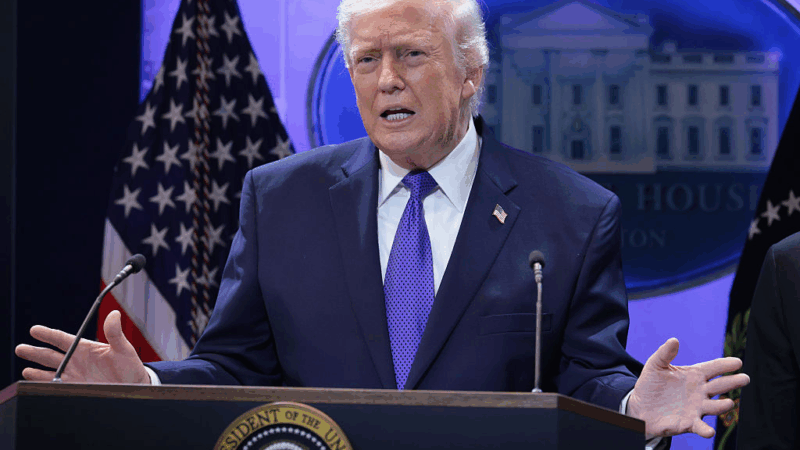Drugmaker Novo Nordisk slashes Wegovy sales forecasts, blaming compounding
Novo Nordisk’s shares plunged more than 20% Tuesday, after the company cut the forecast for its flagship obesity drug.
Before the markets opened, the company announced that sales of its obesity medicine, Wegovy, are expected to grow no more than 14% this year. That’s down from its prediction of up to 21% on May 7.
The company blames cheaper alternatives made by compounding pharmacies, which are allowed to make what are essentially copies of drugs when they’re in short supply. Wegovy and Ozempic, a diabetes drug sometimes prescribed for weight loss, had been on the Food and Drug Administration’s drug shortage list, paving the way for a boom in compounded versions.
The FDA ruled that the shortage of Wegovy was over earlier this year. But some compounders are testing the legal landscape. They’re customizing obesity drugs for patients by adding vitamins or tweaking doses.
Novo Nordisk says it is “pursuing multiple” strategies to end the practice, “including litigation.”
Compounding pharmacies typically help patients whose needs aren’t met by existing approved drugs. The compounded drugs are not generics, nor do they go through the FDA’s approval process. Instead, compounding pharmacists tailor drugs for individual patients who need them and are mostly regulated on the state level by boards of pharmacy.
For instance, if a drug is only available as a pill but an elderly patient can’t swallow one, a doctor could write a prescription so that a compounding pharmacist could prepare it in liquid form.
Novo Nordisk also announced a new CEO Tuesday, Maziar Mike Doustdar, who has been at the company for 33 years. He will succeed Lars Jorgensen, whose departure was announced in May.
“Now, the fact that my announcement comes right after the guidance update, well, it just makes the mandate ahead even more clear,” Doustdar told investors on a Tuesday morning call, promising efficiency, growth and shareholder value.
But Scott Brunner, CEO of the Alliance for Pharmacy Compounding, says Novo Nordisk and its competitor Eli Lilly have misrepresented compounding pharmacists.
“GLP1 compounding is demonstrably not illegal – though one can argue that saying so gives Novo a handy excuse for having to cut its earnings forecast,” he wrote in an emailed statement to NPR. “Custom compounded medications are allowed under the Food, Drug, & Cosmetic Act when a prescriber judges that a custom formulation, which is not available commercially, will make a significant difference for a particular patient. That authority applies to any drug that meets the criteria for compounding, not just GLP1s.”
Health economist Rena Conti says Novo Nordisk’s situation is “not surprising.”
“Compounding sales have increased dramatically this year as compound pharmacies have [undertaken] aggressive marketing and other techniques to increase profits,” says Conti, a professor at Boston University.
She says that Novo Nordisk’s competitor, Eli Lilly, which makes Zepbound, has also been gaining new customers by selling discounted vials directly to consumers who aren’t using their insurance. It has converted them from using the compounded versions to the brand.
Eli Lilly CEO David Ricks told NPR in March that every month, roughly 100,000 people buy Zepbound directly from Eli Lilly through its website.
Novo Nordisk’s effort to sell Wegovy directly to consumers paying cash hasn’t been as successful as expected, the company said.
“As unsafe and unlawful mass compounding continues, the Wegovy penetration within the cash channel has been lower-than-expected,” Novo Nordisk said in its Tuesday morning statement. “Within this channel, NovoCare Pharmacy was launched in March 2025. Wegovy prescriptions via NovoCare Pharmacy (including TeleHealth collaborations) amount to around 11,000 total weekly prescriptions, in addition to around 20,000 weekly prescriptions in the retail cash channel.”
U.S. has a quarter fewer immigration judges than it did a year ago. Here’s why
The continued drain of personnel from the already strained immigration court system has contributed to depleted staff morale, mounting case backlogs — and floundering due process.
Influencers are promoting peptides for better health. What’s the science say?
The latest wellness craze involves injecting these molecules for athletic performance, longevity and more. Scientists say the research isn't keeping pace with the health claims.
The owners want to close this Colorado coal plant. The Trump administration says no
The Trump administration has ordered several coal plants to keep operating past their planned retirement, part of a larger effort to boost the coal industry. Two Colorado utilities are pushing back.
Poll: Most say the state of the union is not strong and the U.S. is worse off
Ahead of the State of the Union address on Tuesday, evidence continues to mount that President Trump is facing political headwinds.
Mexico fears more violence after army kills leader of powerful Jalisco cartel
School was canceled in several Mexican states and local and foreign governments alike warned their citizens to stay inside following the army's killing of the leader of the Jalisco New Generation Cartel, Nemesio Rubén Oseguera Cervantes, "El Mencho," and the violence it spurred
Newly discovered dinosaur species was a fish-eater with a huge horn
The semi-aquatic dinosaur, Spinosaurus mirabilis, was discovered by an international team of scientists working in Niger.








